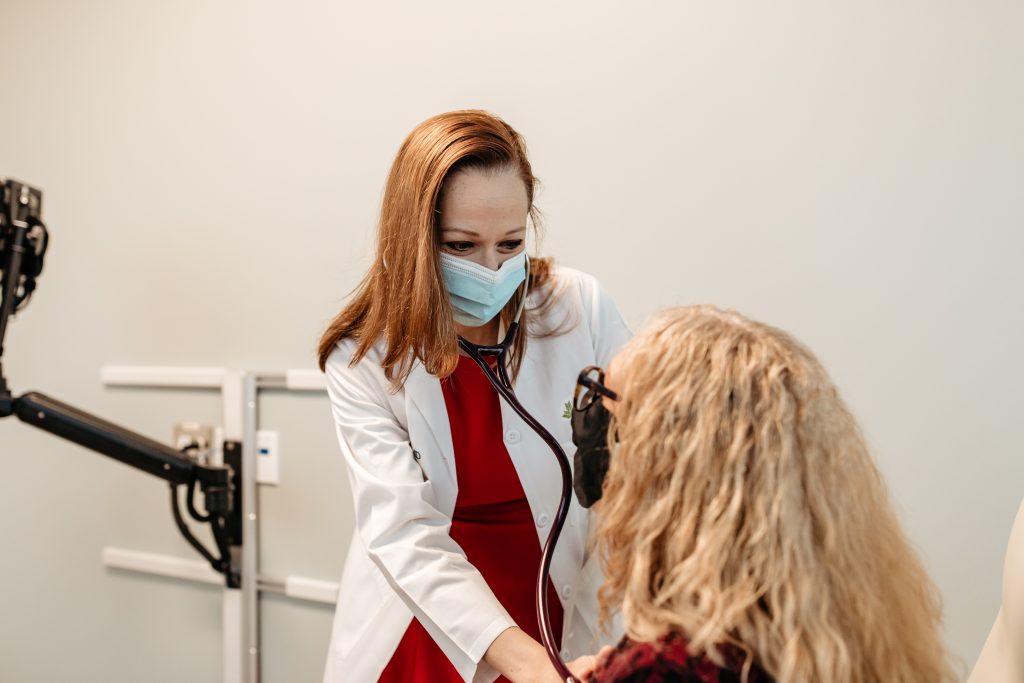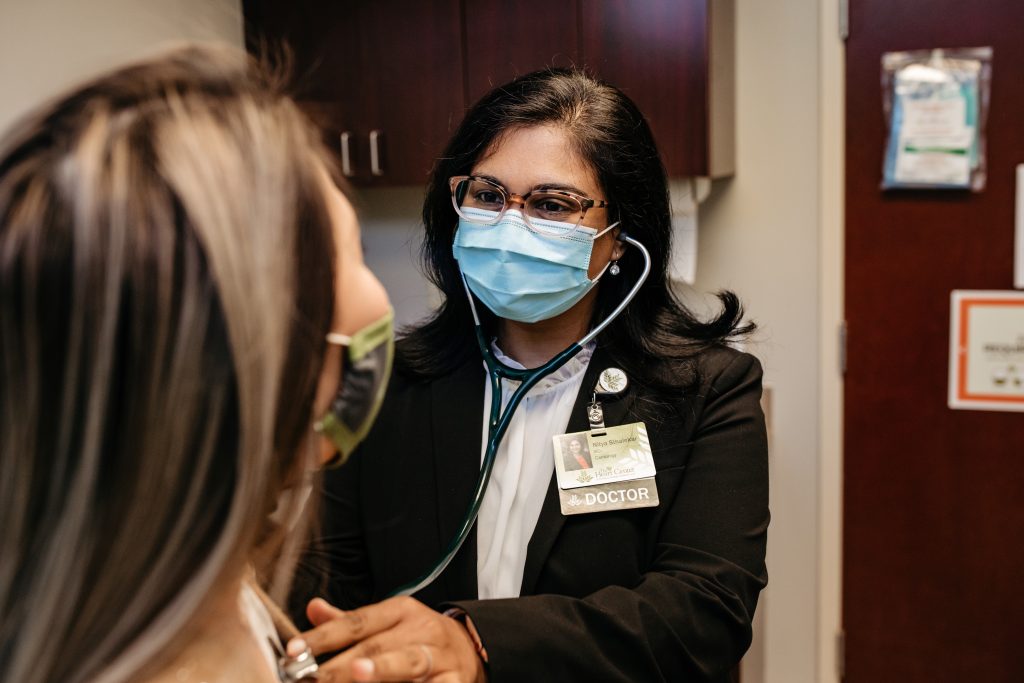Heart Care Specialized for Women
For years, heart disease was commonly thought to affect men more frequently than women. Today, however, the condition is recognized as the nation’s leading cause of death for women – claiming nearly one in every five female deaths in the US. Even so, less than half of women recognize heart disease as the single greatest threat to their health, according to a survey published by the American Heart Association.

What’s even scarier, because many women overlook the importance of their heart health, they delay getting an early diagnosis and treatment. This means that women experience more advanced stages of heart disease that are often more severe and can be more challenging to overcome long term.
That’s exactly why Georgia Heart Institute created the Women’s Heart Center – to help women feel comfortable and supported while receiving whole-person care that lasts a lifetime.
Cardiovascular Diseases Related to Pregnancy
While conditions that develop during pregnancy often resolve after delivery, they can impact heart health long term and increase the risk of developing heart disease in the future.
- Gestational Diabetes: This is a specific type of diabetes – a condition that affects how your body and cells use sugar – that’s diagnosed during pregnancy. Even after delivery, gestational diabetes can increase the risk of developing type 2 diabetes, as well as making the development of calcium in the heart arteries more likely.
- Peripartum Cardiomyopathy: During the final month of pregnancy, or following delivery, some women may develop cardiomyopathy, a condition in which the heart muscle becomes weakened temporarily and pumps blood less effectively. This particular form of cardiomyopathy typically resolves within a matter of weeks and many patients will regain full heart function.
- Preeclampsia: This is condition that can develop during pregnancy that causes high blood pressure and strain on the body’s organs, namely the liver and kidneys. This condition can be extremely serious, taking a toll on overall health even after delivery. Having preeclampsia increases a woman’s risk of having high blood pressure, blood clots and heart attack later in life.
- Hypertensive Disorders: There are different levels of hypertension (high blood pressure) that can develop during pregnancy, with preeclampsia being one of the more severe. Women may also experience gestational hypertension or chronic hypertension, both of which increase the likelihood of having hypertension long term.
Conditions We Treat
While the same types of heart disease may affect both men and women, there are certain factors that change how diseases present in women, including whether or not they cause symptoms and how they progress. Additionally, there are some conditions that are completely unique to women or are more common in women, these include:
When there is plaque build-up in the blood vessels that supply the heart with blood, this is known as coronary artery disease. In some cases, plaque build-up, spasm, or dysfunction may affect smaller blood vessels, rather than the larger, primary coronary arteries. This condition known as coronary microvascular disease (CMD) cannot be diagnosed by a standard heart catheterization or coronary angiogram and requires advanced microvascular testing.
Overtime, plaque causes the vessels to become narrowed and stiff – a condition called atherosclerosis. As plaque and atherosclerosis reach more advanced stages, they can decrease blood flow and lead to chest pain, also known as angina.
Cancer treatments, while life-saving, can take a surprising toll on the entire body, including the heart. The most common heart condition patients may develop while undergoing cancer treatment, or afterward, is heart failure – when the heart can’t pump enough blood to meet the needs of the body.
Cancer treatments can also cause low blood pressure (hypotension), high blood pressure (hypertension), heart rhythm disorders (arrhythmias) and structural heart diseases.
Ongoing research has found that the hormone, estrogen, has a positive impact on heart health, specifically supporting the strength and flexibility of blood vessels, improving blood flow. However, once women go through menopause, estrogen levels naturally decrease, which may contribute to the development of plaque in the arteries, along with high blood pressure and high cholesterol.
This is a rare condition that affects blood flow when an individual is changing positions, typically when they are moving from a reclined position to an upright position. This is also the result of an issue with the body’s nervous system and cardiovascular system, where blood pressure and blood flow can’t be maintained during a change in position. Individuals with POTS may experience lightheadedness, rapid heartbeat or discomfort upon standing, which may be relieved by sitting.
This very rare condition occurs when there’s a sudden or spontaneous tear in one of the coronary arteries, which disrupts blood flow to the heart (heart attack) and causes the artery wall to bulge inward. This uncommon condition does not have many clear risk factors or causes, but it is more common in young women than men.
Also known as broken heart syndrome, this condition causes a sudden weakening of the heart muscle brought on by emotional and/or physical stress. When triggered by a stressful event, the body releases high amounts of stress hormones, namely adrenaline. This spike can be overwhelming to the heart and lead to a decrease in blood flow. Luckily, the symptoms of stress-induced cardiomyopathy often resolve in a matter of weeks and heart function is fully restored.
Services We Offer
With our comprehensive Women’s Heart Center, Georgia Heart Institute is able to treat a range of heart diseases that uniquely affect women, from some of the most common conditions to those that are more complicated or severe.
Beginning with a personalized and comprehensive heart consultation, the experts of the Women’s Heart Center will have a complete overview of your overall heart health, identifying key risk factors and care needs. Performed by one of our female non-invasive cardiologists, your consultation will include:
- Physical Examination: including blood pressure measurement and an EKG to check the electrical activity of the heart
- Review of Medical History: including your family history, lifestyle/daily habits, pregnancy/reproductive history
- Blood Work: including cholesterol, blood sugar and biomarker screening
Building on this heart health consultation, the multi-disciplinary team of the Women’s Heart Center will collaborate to develop a personalized care plan, which may include advanced testing and diagnostics, medical therapies and treatment from the other specialties of Georgia Heart Institute.
The advanced coronary microvascular testing available through the Women’s Heart Center is a true differentiator for our patients. Because the small coronary arteries, or microvessels, are so small, it’s impossible to diagnose coronary microvascular disease (CMD) with traditional imaging techniques.
The gold standard for testing and diagnosing CMD is through cardiac catheterization with measurement of coronary flow reserve and coronary reactivity testing, which is a minimally-invasive test performed by Georgia Heart Institute’s interventional cardiologists. Georgia Heart Institute is one of the few programs around the country that have the technology and expertise needed to diagnose and treat CMD, which is often overlooked or misdiagnosed. This specific type of disease requires expertise and a collaborative team-based approach to detect and effectively care for these patients. The goal is improving the symptoms and lifestyle of patients microvascular disease.
Why Choose Georgia Heart Institute?
Bringing together experts from non-invasive cardiology, electrophysiology, heart failure, interventional cardiology and vascular surgery, the Women’s Heart Center of Georgia Heart Institute is prepared to care for any and all heart care needs unique to women.
Built on the expertise of our multi-disciplinary team, the Women’s Heart Center offers the most advanced and innovative diagnostic and treatment services available, all to ensure a healthier future.

Plus, our women’s heart experts are actively involved in research and clinical trials, which further informs and enriches the exceptional care they’re providing.
With a true passion for women’s heart health and ample expertise, we concentrate on the entire care journey, spanning from education, awareness and prevention through early recognition and treatment. Through open communication and compassion, we’re able to connect with each woman and ensure understanding. We consider their background, risk factors and overall heart health before determining the best services and treatments.
Ultimately, our specialized care is designed to transcend generations – saving and improving the lives of mothers and daughters alike.

